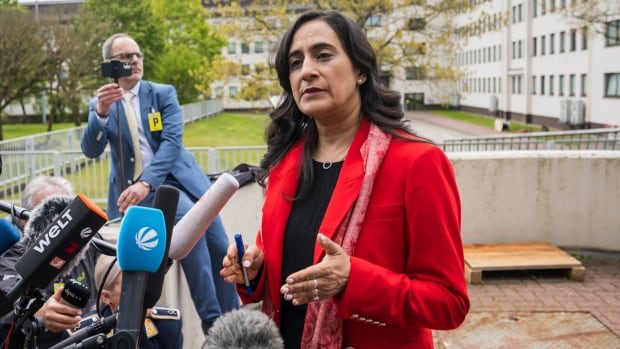Global Courant 2023-04-30 14:58:46
Evacuation flights to bring Canadians home from Sudan have ended, the federal government said Saturday night, amid escalating violence and deteriorating security conditions.
The government said Canadians wishing to leave Sudan by road should consider leaving via Port Sudan where commercial options may be available.
It advises people not to travel to Wadi Seidna airport because of “the deteriorating security situation”.
Earlier Saturday, Federal Defense Minister Anita Anand said efforts to bring Canadians home from Sudan will continue as long as possible.
She said at least one evacuation flight was planned by the Canadian military on Saturday. It would be the fifth to leave the Sudanese capital Khartoum since Thursday.
Hundreds depart on Canada-led flights
About 221 people were on board two planes that took off Friday, including 68 Canadians and six permanent residents, Anand said. A total of 375 Canadians known to be in the country have departed on Canada-led flights or flights operated by allies, she added.
“We will continue to flee as long as possible, but I will say that the situation is dynamic,” Anand told reporters at a press conference on Saturday morning.
“We are exploring all options.”
British nationals walk to Sudan’s Wadi Seidna airport on Wednesday to board an RAF aircraft during the evacuation to Cyprus. (Arron Hoare/UK Ministry of Defence/Reuters)
Those options, she said, include exploring evacuation efforts by land or sea. Two naval vessels bound for the Indo-Pacific region have instead been diverted to remain near the city of Port Sudan in case they can be used to get Canadians home in the future, Anand said.
She declined to comment on other options, but said moves by other allied nations could steer Canada’s efforts.
“The United States ran a convoy yesterday and that’s the kind of initiative we’re following,” she said, emphasizing for the second day in a row that the window for air evacuations was closing.
Democracy hopes are gone
The Sudanese capital of Khartoum, a city of some five million, has turned into a frontline in the ongoing conflict between General Abdel Fattah Burhan, the commander of the Sudanese army, and General Mohammed Hamdan Dagalo, who leads the powerful paramilitary group. known as the Rapid Support Forces. The two weeks of violence between the two sides have dashed the once euphoric hopes of Sudan’s transition to democracy.
Canada’s evacuation efforts were stepped up later than some Allied countries. Britain said on Saturday it would end its evacuation flights after demand for places on the planes fell. Officials there say more than 1,500 people have flown out of the country so far.
A ferry will carry some 1,900 evacuees across the Red Sea from Port Sudan to Saudi Arabia’s King Faisal Naval Base in Jeddah, Saudi Arabia, on Saturday. (Fayez Nureldine/AFP/Getty Images)
Azza Ahmed was among the Sudanese-Canadians who made it home, though she gives Ottawa little credit for her safe escape.
A family visit to Khartoum that was expected to last until May 8 was cut short when violence erupted, prompting Ahmed and her relatives to register their presence in the country with Global Affairs Canada.
She said she received a call at 1 a.m. last Monday from Canadian officials telling her a German-led flight could carry her and her Canadian relatives within nine hours if they could arrive on time at Khartoum airport, 15 miles away. .
After siphoning all of her family’s gas into one car, Ahmed said what should have been a half-hour drive to the airport took two hours.
‘Nobody seemed to care about us’
Despite driving her family through the back roads of Khartoum, her cousins’ car was stopped by members of the Rapid Support Forces. Ahmed’s cousins were released after they got out of their car, emptied their pockets and explained that all of their passengers were women trying to get to safety.
Once at the airport, she and 40 other Sudanese-Canadians departed Sudan for Jordan before being flown to Germany. There, Ahmed and her family booked a commercial flight to Toronto, arriving on Wednesday. Ahmed’s cousins had no choice but to stay behind.
“The Kuwaitis, the Indians, the French and South Korea – they were able to get their citizens out safely so many days before the Canadian embassy even contacted us. I was surprised that we were one of the last countries to were evacuated,” he said. Achmed. “(Canada) was able to get their diplomats out within days. But nobody seemed to care about us.”
LOOK | Azza Ahmed describes escape from Sudan:
Canadian woman describes escape from Sudan
Azza Ahmed talks about the stress of escaping the Sudanese capital of Khartoum via a German military flight.
Anand said earlier Saturday that she is confident military members can work effectively with Canada’s allies to bring other expatriates to safety.
About 1,800 Canadians informed Global Affairs that they were in Sudan.
The department has previously said that about 400 Canadian citizens, permanent residents and their families have applied for consular assistance, but only a fraction of them want help leaving the country.
About 300 Canadians have already flown to safe third countries amid a significant increase in violence in Sudan over the past two weeks, officials said Friday. Others have left on their own accord and travel to neighboring countries by car or bus.
Despite a ceasefire extended under heavy international pressure, residents said clashes continued on Saturday around the presidential palace, state broadcaster headquarters and a military base in Khartoum. The battles sent thick columns of black smoke rising over the city’s skyline.
Anand said Canada welcomed the ceasefire and redoubled its calls for a peaceful end to the ongoing violence. The Sudanese doctors’ syndicate estimates that fighting since the April 15 eruption has killed more than 400 civilians and injured more than 2,000.








